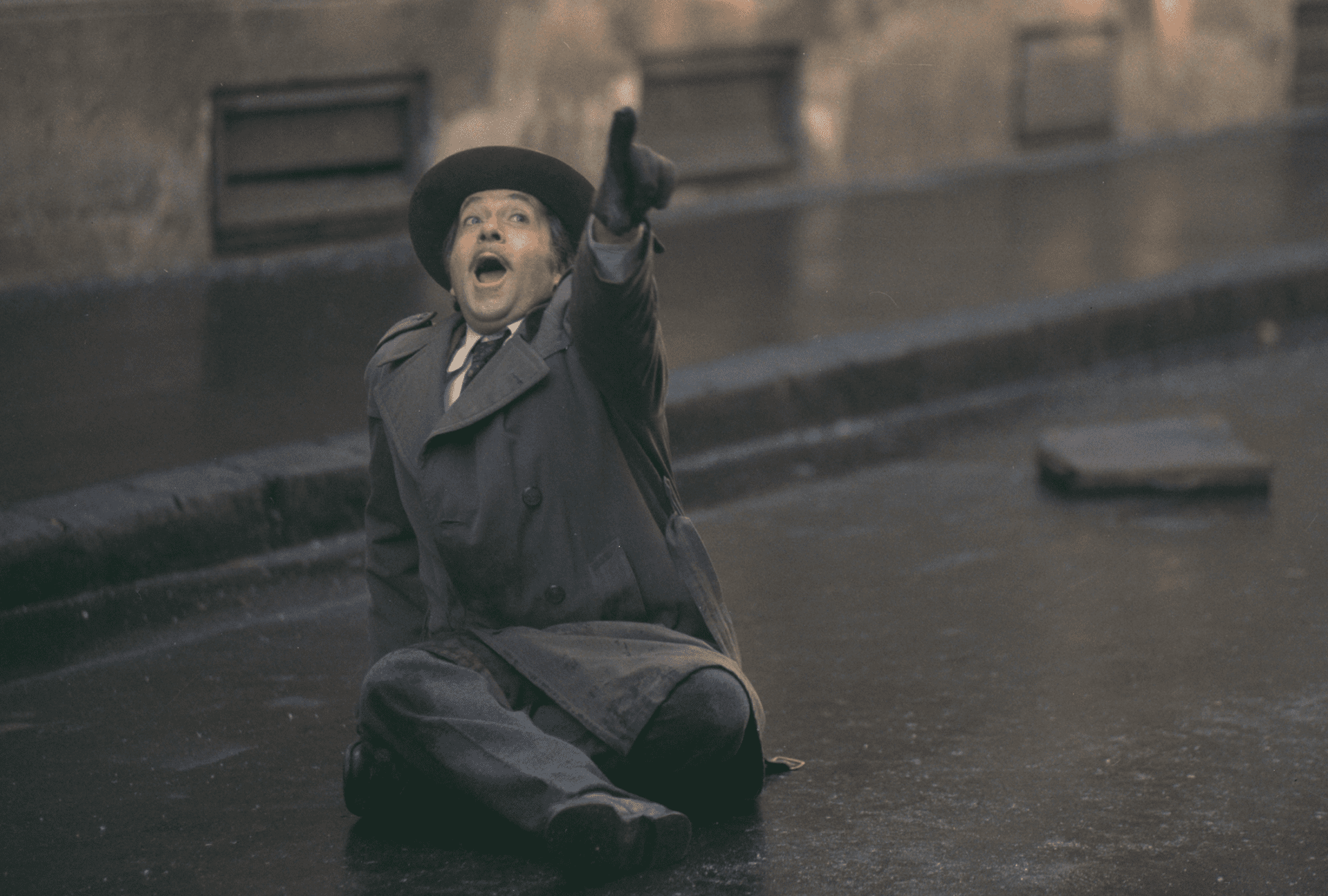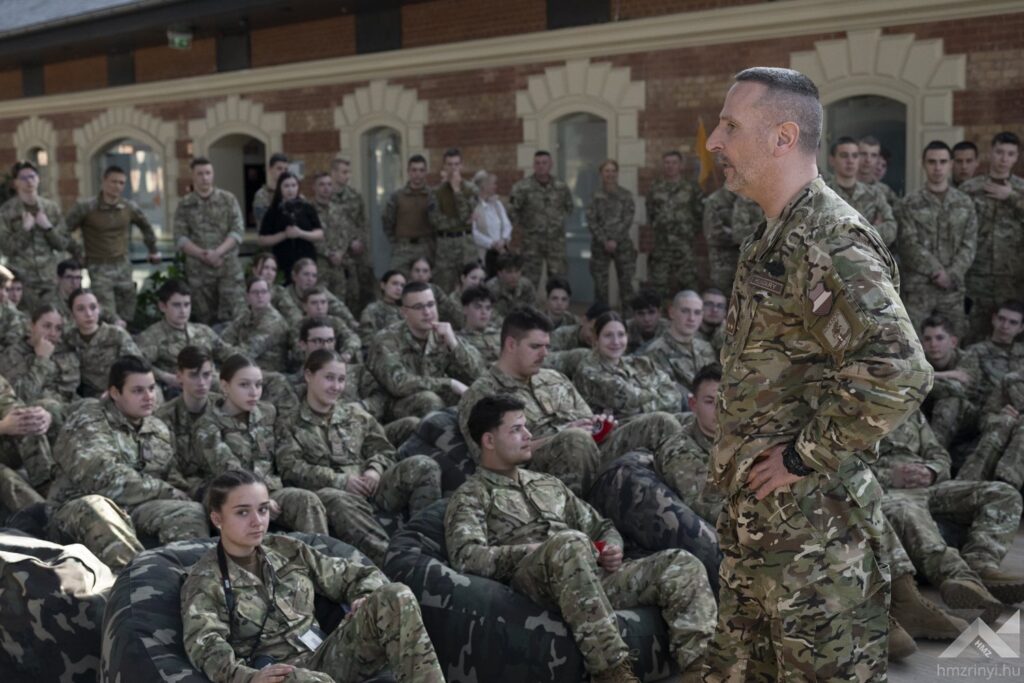The film The Fifth Seal is an adaptation of Hungarian writer Ferenc Sánta’s novel (the book was translated to English in 1986 by Albert Tezla). The plot is set during the darkest times of World War II, specifically in mid-December 1944, when Budapest is ruled by the infamous Arrow Cross, the Hungarian fascists who came to power with a coup in October in Nazi-occupied Hungary. Despite the curfew and the Arrow Cross terror keeping the residents of the city in fear, a small group of friends gathers for their regular evening chat in a tavern. The friends, a carpenter, a watchmaker and a bookseller, are joined by a stranger, a crippled war veteran, a photographer by profession. The film, first screened in 1976, revolves around the question, discussed by the four men, whether it is a person’s life or his honour that is worth more.
If one can only save one of the two, which one should they choose?
The men, ordinary Hungarians, engage in a tense debate, exchanging opinions about the role of human dignity.
The discussion about the importance of dignity is triggered by a hypothetical question Gyurica, the watchmaker poses to his friends: if they could choose between being reborn as a slave or as a slaveowner, which one would they choose? He then tells the story of a slaveowner who is a rich man living a luxurious life with power to do whatever he wishes to his slaves. The slaveowner does not have a bad conscience about his actions, as he believes that he acts in accordance with the morals of his time. The slave, on the other hand, is humiliated and tortured all his life and lives in deep poverty. However, the slave bears his suffering with dignity, believing that he is morally superior, an innocent victim of his rich but evil master. Most of the friends struggle to come up with an answer, and leave the tavern late at night still thinking about the dilemma.
When the friends gather on the following evening, still preoccupied with the dilemma, their discussion is interrupted by Arrow Cross thugs who breaks into the tavern and capture the friends. After keeping them in captivity for the night, the young leader of the Arrow Cross (played by one of the greatest Hungarian actors of all time, Zoltán Latinovits) promises the four men to let them go free if they slap a tortured and dying prisoner across the face—or execute them if they refuse to do so. When asked why he wants these ordinary men to hit the tortured man, the Arrow Cross leader says that this challenge serves an ‘educational’ purpose. All ordinary men should become accomplices of the dictatorship out fear—and this is what he intends to teach to the group. It is not physical violence, but making one to go against his own values ‘voluntarily’ is what breaks resistance against totalitarian regimes.
Since the film was produced under Hungary’s state socialist regime, here the fascists are represented as the totalitarian power, while the tortured man is a Communist partisan. Nevertheless, in a covert manner,
the film is a testimony against all totalitarian regimes.
The dilemma of whether to slap the tortured man across the face or not is also a reflection in the debate the friends had the evening before—after so many words said while arguing whether they would be slaves or masters, how do they really live their life? Do they choose to die with honour or to live without dignity? In the end, three of the four men refuse to take part in the torture and face their ultimate punishment—while one goes along with the Arrow Cross’ demand.
The question of humanity and dignity in suffering is central to the film and very visually represented. The title, The Fifth Seal refers to the prophecy in the Book of Revelations: the opening of the Seven Seals of God unleashes a series of apocalyptic events on Earth, and when the fifth seal is opened, the souls of martyrs cry out to God for justice. The scenes of the apocalypse that surrounds the tavern are strengthened by visual references to images by Hieronymus Bosch, the painter of humanity’s deepest desires and fears. One of the friends, Király paid for the dinner with his friends with the proceeds from selling a book on Bosch, and the scenes of the Dutch master’s painted landscapes regularly emerge in the film to emphasize the surreal nature of the war. The most profound visual reference to suffering, humanity and dignity, as well as Christianity, however, is made by Fábri when the friends are asked to slap the man who is being tortured in a crucifixion position.
The drama which presents the viewers with a thought-provoking moral dilemma is one of the most popular films in Hungary,
one of the highpoints of the Fábri oeuvre, and one of the finest chamber pieces of Hungarian cinema. Zoltán Fábri is one of the most decorated Hungarian film directors and screenwriters with two of his films (The Boys of Paul Street and Hungarians) having been nominated for the Academy Award for Best Foreign Language Film. Many of his works revolve around the question of humanity, therefore, World War II often reappears as the backdrops of his movies. The novel the film was based on, Ferenc Sánta’s book was voted as one of Hungary’s 70 favourite books in 2005. In 2012, the film directed by Zoltán Fábri was selected to be the 10th best Hungarian motion picture ever made. It also won the Golden Prize at the 10th Moscow International Film Festival, and it was also nominated for the Golden Bear prize at the Berlin International Film Festival in 1977. While the film is a fascinating watch at any time of the year, the cold days of December when the film is set, too, and the ongoing conflict on the European continent give a sadly fitting background to watching The Fifth Seal now.








